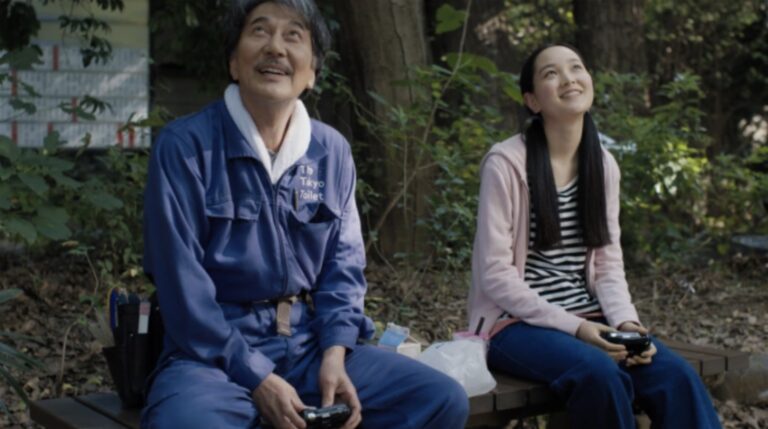Perfect Days (2023 | Japan | 123 minutes | Wim Wenders)
I love a movie that lets us watch an artist at work (see also, Showing Up) especially when it’s a craftsman of a job I’ve never considered. Every day Hirayama (Kōji Yakusho, quietly phenomenal), wakes up, folds his sleeping mat, gets ready for the day ahead, buys a coffee from the vending machine outside his flat, pops a cassette tape in his truck’s stereo, and drives around Tokyo to clean public toilets. At night, he gets dinner at his favorite ramen place, watches a bit of baseball, returns home, and reads a few chapters of a used novel from his growing library before falling asleep. The whole clockwork routine repeats every day.
On the surface, going through a week in his regimented life might sound boring, but Wenders finds a way to make it anything but. First and foremost, Tokyo’s public toilets are a marvel of public infrastructure, each with a novel architectural design integrated perfectly into its neighborhood or park, worthy of their own documentary. The facilities themselves are wondrous and the care that Hirayama brings to his work makes even the most mundane seem fascinating. Kōji Yakusho disappears so completely into his character, his commitment to appreciating the quiet beauty of world around him, and to his craft. Wenders similarly captures his days with the well-practiced eye of an esteemed documentarian, making it easy to believe that we are gaining rare insight into a real person and to be invested in his well being.
Without a doubt, Perfect Days is a film that requires and rewards patient curiosity from its viewers. Because Hirayama has seemingly created a rigorous routine for himself, we also feel the effect of even small perturbations in the different days of the week or when the unpredictable behavior of others change the course of his perfect days. An unreliable, but well-meaning co-worker’s romantic yearnings spin us into the underground world of Tokyo’s used cassette marketplace. An unanticipated visit from a younger relative shows us both an outsider’s perspective on his work as well a hinting glimpse at his past life. When his favorite diner is unexpectedly closed, we later find out — in a surprisingly tender moment of connection and shadow-play — more about the other ancillary characters who populate his world.
Each day, Hirayama snaps a few photos of the world around him — usually fleeting interactions of light and shadow (inspired by the concept of komerebi. Versions of these images (curated by Wender’s wife Donata) form a dreamlike counter-narrative to the otherwise documentary-like renditions of his daily life. Each small interaction widens what seems like a narrowly focused existence. When it ends with another cassette tape playing along with one of the best direct-to-camera long-takes since Call Me By Your Name, we realize we’ve learned everything we need to know about this remarkable man with him having said barely anything at all.
At long last Perfect Days will have a theatrical release in Seattle on February 16, including a run at SIFF Cinema.
Image courtesy NEON.




